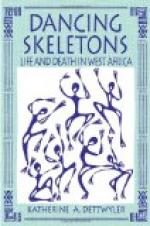|
This section contains 1,404 words (approx. 5 pages at 300 words per page) |

|
Historiographical Context. Western-influenced scholars often divide West African history into "precolonial," "colonial," and "postcolonial" periods. Others divide it into "traditional" and "modern" eras demarcated by the arrival of western Europeans, who brought with them Christianity and modern science—ignoring the much earlier arrival in West Africa of Islam and Arabic learning that in many instances was more advanced than the scholarship of Europe during the same period. While these familiar classifications may be valid for studying many aspects of West African history, they are not particularly helpful for the investigation of the origins and evolution of religion and philosophy in West Africa. Unlike politics and economics, for example, religion and philosophy were the aspects of West African life most resistant to change. Peoples' religious views and folk philosophies were not automatically transformed along with changes in government and economic systems or the arrival of new religious influences...
|
This section contains 1,404 words (approx. 5 pages at 300 words per page) |

|



